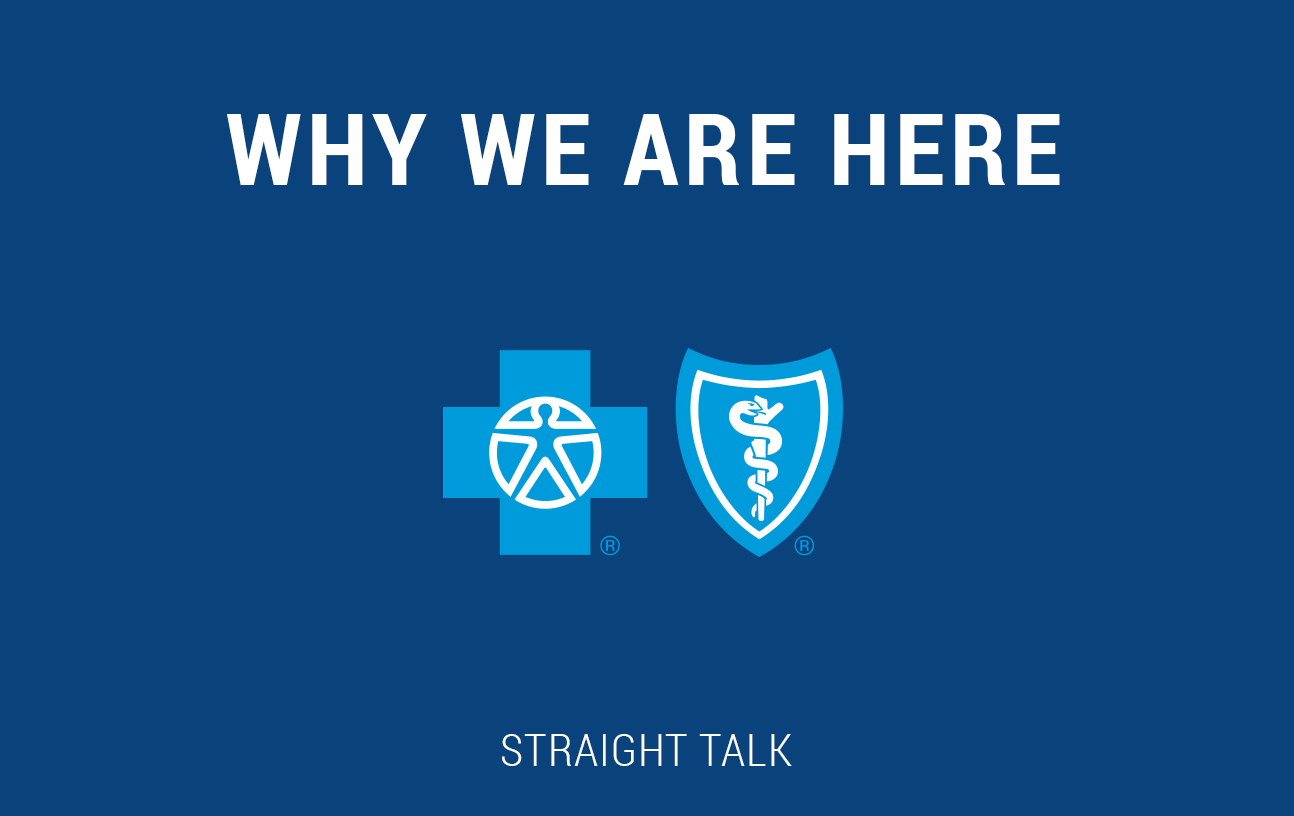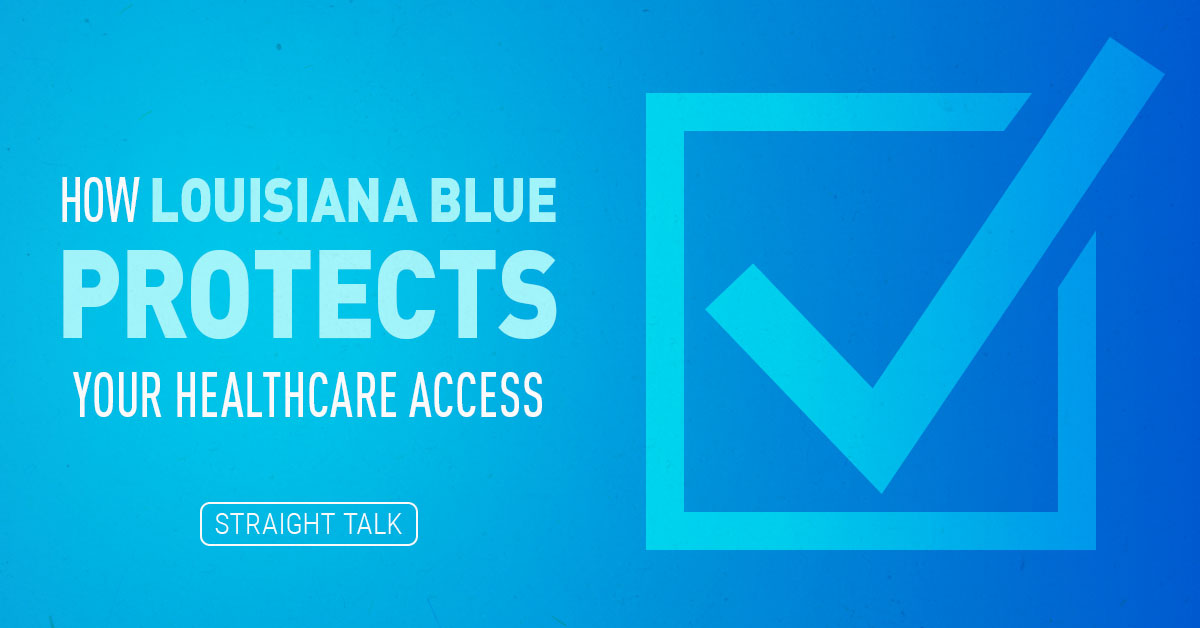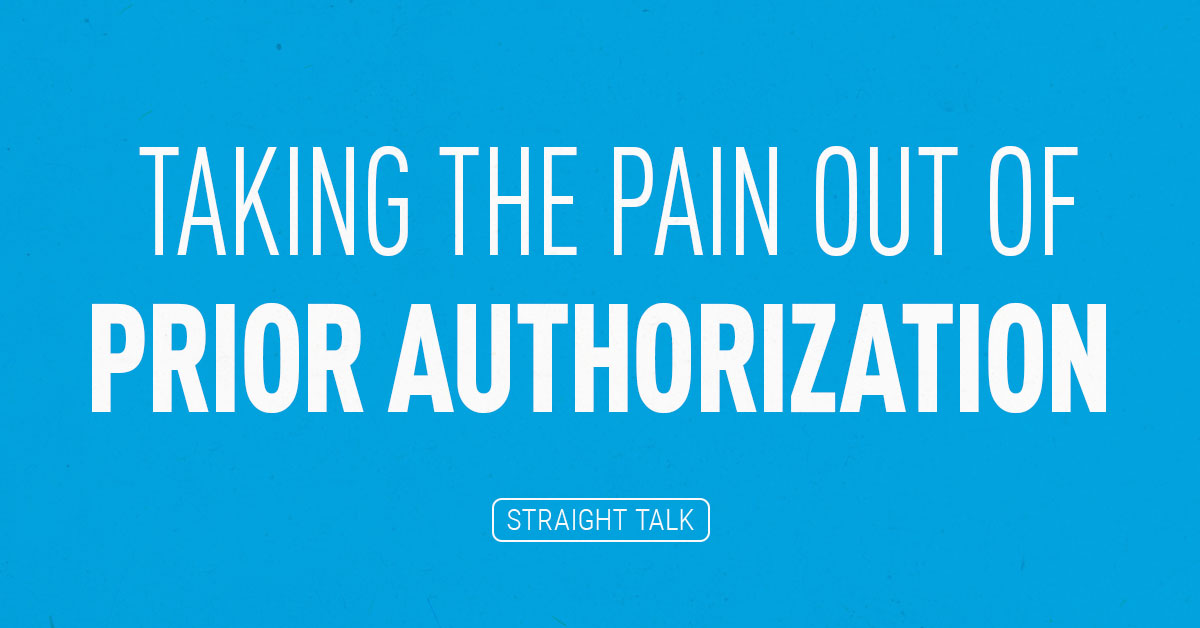Every two weeks, I have the distinct pleasure of speaking to a group of Blue Cross’ newest hires in a class we call Health Insurance 101. The crux of the lesson is a simple one: What’s the point of Blue Cross and Blue Shield of Louisiana? Why are we here?
It boils down to this:
“Blue Cross exists for the simple reason that here in America we’ve managed to build a healthcare system that 99% of Americans CANNOT afford to pay for out of their own pockets. This means our job is to help them get the healthcare they could never afford to pay for themselves.” (That was me, I said that!)
Now, to consistently do this well for almost 85 years is a pretty big chore. To make sure we are giving Louisianians access to quality care they can afford, we have to make sure we’re all focused on one, clear mission. That’s an easy one. Our mission is:
To improve the health and lives of Louisianians.
Three Essential Duties
Of course carrying out our mission is more complex than it sounds, which leads to another important part of the lesson that I call the three essential duties. There are three essential, drop-dead, gotta-get-it-right duties that your Blue Cross plan has to get 100% right (or as close to it as possible) every single day.
The good news is, since we are a not-for-profit company owned by our policyholders, we’re not in business to turn a profit on behalf of millions of anonymous shareholders scattered around the country. Hooray for that!
So, here are the three things we have to get right, every single day:
Number 1: Have Enough Money to Cover Members’ Medical Needs
We MUST have enough money on hand to pay the medical claims that come in every day. Is that a big deal? Definitely! Our members use around $250 million a month worth of healthcare, which is almost $3 billion a year!
What do you think would happen if a doc or a hospital presented us with a bill one day, and we couldn’t pay it? BAD things. Very bad.
Don’t even think about it.
“So Mike, how have you made sure you have enough money every day for 85 years?”
The key to getting that right is actually pretty simple. We hire geniuses, and we listen to them. These particular geniuses have advanced degrees in mathematics and are called actuaries.
They build forecasting models to predict how much healthcare our members will need in a given timeframe, and they use that data to tell us how much premiums should be. As an economist, I also build models, so I get to compare notes with them all the time. And I can tell you, their track record is astounding. I listen to them!
Number 2: Negotiate the Best Possible Rates on Behalf of Our Members
We MUST represent our members in negotiations with medical providers. Our negotiations not only help get our members the best deals, they also ensure that our members have tightly contracted networks to use.
Essentially, we stand in the breach every day between medical providers and our members to make sure the prices they and we pay for healthcare are as reasonable as we can get them in all the different markets in Louisiana.
Since 83-85% of premium pricing is pure healthcare spending, keeping those prices under control makes the difference in whether or not health insurance is affordable.
Our Provider Contracting department is constantly negotiating with about 100 acute-care hospitals in Louisiana and tens of thousands of doctors to get our members the best rates possible.
What does that look like in real life? Here’s a simple example.
In April, a close relative of mine who has Blue Cross coverage had an emergency. She had to be taken by ambulance to an emergency room where she had several different tests. She spent the night and was released in the morning. As her bills started coming in, she was surprised by the numbers, so she asked me to take a look at them to make sure they made sense.
I’ve received her permission to share a few of her charges with you because they so clearly demonstrate how Blue Cross and Blue Shield of Louisiana’s negotiations with network providers affect how much you would otherwise pay for care.
While I’ve withheld her name, these are real charges and real payments for real services, though I have rounded them off a bit. You should know that she has a $3,000 deductible, so she was responsible for paying costs in the column called “Blue Cross Member Charge.”
| Service |
Medical Provider Charges |
Blue Cross Member Charge |
Member Saved |
| Ambulance Ride |
$2,247 |
$1,151 |
$1,096 |
| ER Doc Consulting |
$1,232 |
$171 |
$1,061 |
| Ultrasound Abdomen |
$104 |
$48 |
$56 |
| Chest X-Ray |
$35 |
$14 |
$21 |
| Totals |
$3,618 |
$1,384 |
$2,234! |
Can you imagine if that third column weren’t in the picture? Now, think about the fact that more than 40% of American households with health insurance now have deductibles of more than $3,000 per year.
My relative avoided over $2,200 in charges simply because she was a Blue Cross member and got the benefit of our negotiating power and prowess. That’s another strong reason why we are here. And, since this was an emergency, she really didn’t have a chance to shop around or check prices before going in for care. She received that protection simply because we care about our members as our top priority.
Number 3: Make Sure We’re Covering Healthcare Services That Are Safe, Affordable and Effective
We must guarantee that our insurance policies cover all the right drugs and medical treatments that our members need, which are also safe and effective for our members. I often get asked, as I travel around and follow social media, things like this:
“Hey Mike, doesn’t your company make lots of money by denying people care? Isn’t that how you turn a profit? How do you decide, at the end of the day, what to cover, and what not to cover? Will you not cover a treatment because it’s too expensive, even if it works?”
These are excellent questions, and I like the chance to answer them and show the real way we make decisions about medical care.
You might not know this, but we have doctors, medical researchers and nurses on our staff. Lots of them. And their job often involves talking to the docs and hospital in our networks, to guarantee that the care our members receive is both safe AND effective. These licensed medical professionals spend the majority of their time poring over the latest research on a huge variety of medical topics to make sure we are on the cutting edge of what works and what doesn’t work in the care we cover for our members.
Let’s face it, just because a treatment or service is available doesn’t mean it’s the best, safest or most-effective option. So, how do we decide what to cover and what not to cover?
There’s a three-step process that we use to screen treatments and drugs, too.
- Federal Law—U.S. federal law, especially since the Affordable Care Act, has a LOT to say about what insurance policies must cover. Our first stop in building an effective and compliant health insurance product is always to make sure it complies or even exceeds the requirements in federal law.
- State Law—Louisiana state law contains lots of “mandates,” which are requirements insurance policies must meet to be sold inside Louisiana. These mandates have come over time from our Department of Insurance and Legislature. For our insurance policy to even get off the ground to sell, it has to comply completely or exceed the requirements of federal and state Law.
- Science— If a drug or treatment or procedure is not required under federal or state law, that’s when the real work begins of studying clinical trials and the hard science to see what the risks and rewards are of each treatment. It turns out that many treatments, even very expensive ones, hardly ever cure anyone and sometimes do more harm than good. We want to make sure our members and their healthcare providers are completely educated on the latest research on risks and rewards of such treatments. Our docs will often have a peer-to-peer discussion with network doctors to make sure everyone is on the same page before Blue Cross approves coverage for different types of treatment. It’s really about education and consensus above all things.
We also have a Pharmacy and Therapeutics Committee that performs the same research and decision-making on prescription drugs. Because the price of drugs has escalated rapidly over the past 10 years, this committee has become even more important to our membership and their premiums. In 2004, 11% of all our medical spending was on prescription drugs. In 2017, it was 25%!
Gone are the days where we blindly covered every single drug the U.S. Food and Drug Administration (FDA) approves, because we have learned over the years that some of them are just silly. And when we allow coverage of drugs that have lower-cost, effective alternatives, it drives up the cost of everyone’s premiums.
You can see a strong example of this here. High-priced, clinically ineffective drugs are no longer covered in your health insurance policy, and for good reason, thanks to the hard work of our pharmacists on staff and the Pharmacy and Therapeutics Committee.
I hope this post helps you to understand, in as transparent a way as possible, what our core functions are. You can remember the point of Blue Cross being here this way:
- To make sure we can cover the costs of your critical medical care
- To be your advocate in negotiating fair rates with the medical community and
- To make sure your health insurance is giving you access to quality care when you need it, where you need it
Straight to the point of “Why is Blue Cross and Blue Shield of Louisiana here?”





Excellent explanation